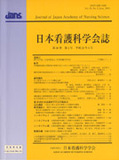Japanese
English
- 販売していません
- Abstract 文献概要
- 参考文献 Reference
要旨
目的:COPD患者のストレス認知が精神的健康に及ぼす影響過程に対して,対処方略(“積極的対応”“自己コントロール”“病気の再解釈”)が調整要因として機能するのかどうかを検討することである.
方法:COPD患者95名を分析対象として,精神的健康を従属変数とする階層的重回帰分析を用い検討した.さらに結果が有意であったものについては,交互作用効果について下位検定を行った.
結果:“病気の再解釈”に精神的健康への調整効果(β=-.439,p<0.01)が認められた.下位検定では,“病気の再解釈”が低い場合には,ストレス認知が精神的な健康を悪化させるが,“病気の再解釈”が高い場合には,ストレス認知度の高低で精神的健康に及ぼす影響には違いが認められなかった.
結論:ストレス認知の程度が高くても対処方略として病気の再解釈を用いる頻度が高ければ精神的な健康が維持されることが示された.COPD患者の精神的な健康の維持を図るうえで,肯定的な意味づけができるように看護介入していくことの必要性が示唆された.
Abstract
Purpose:This study examines stress-buffering effects of coping strategies(“active coping,”“one's own control,” and “meaning of illness”) in the relationship between stress cognition and mental health in chronic obstructive pulmonary disease(COPD) patients.
Methods:Hierarchical multiple regression analysis using mental health as the dependent variable was conducted on 95 COPD patients. Post hoc probing was performed on variables showing significance in order to test for interaction effects.
Results:Interaction effect of “meaning of illness” on mental health were observed(β= -.439, p < 0.01). According to the post hoc probing, when “meaning of illness” was low, stress cognition caused a decrease in mental health. However, when “meaning of illness” was high, no differences in the effect of stress cognition levels on mental health were observed.
Conclusion:Thus, when meaning of illness was frequently used as a coping strategy, mental health was maintained, even if levels of stress cognition were high. This suggests the necessity of nursing intervention to help patients attach positive meaning to illness in order to maintain mental health.
Copyright © 2010, Japan Academy of Nursing Science. All rights reserved.


